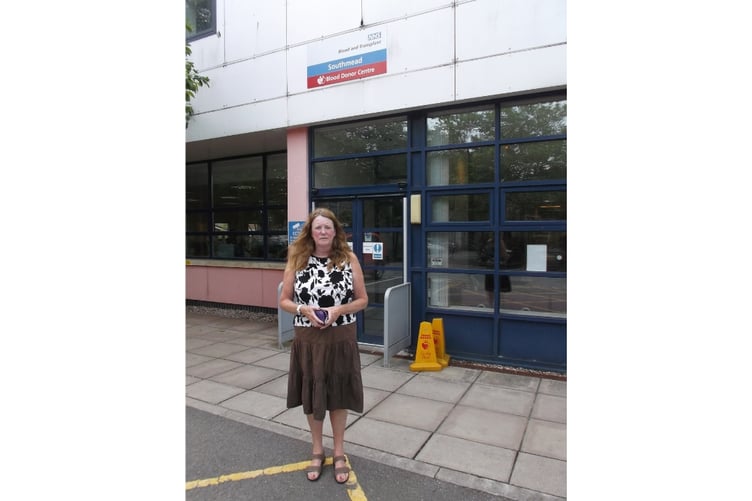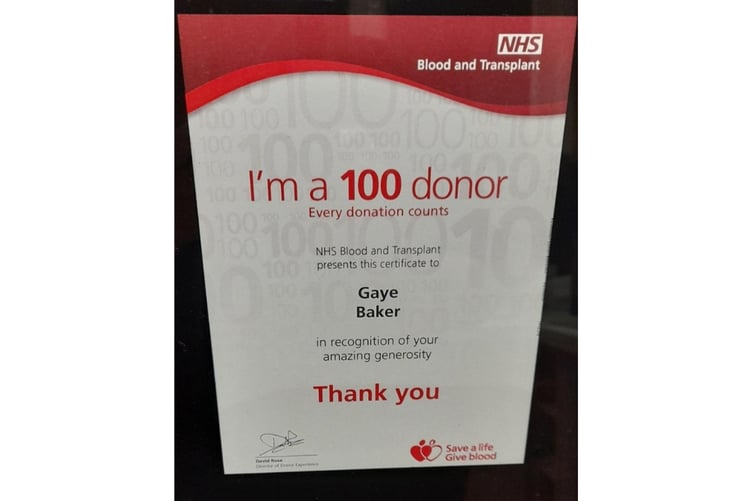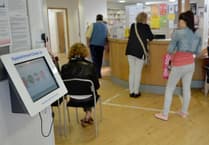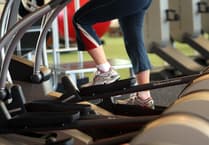Gaye Baker from Paulton has recently given blood for the 105th time, and has already booked in visit 106!
Speaking to The Journal, Gaye told us about her experiences as a blood donor, something she started in 1975 at the age of 20.
“Over the years they have changed the criteria numerous times. At one stage, I managed to donate once every 12 weeks. Now, it’s a minimum of 16 weeks between blood donations for women.”
Gaye has even helped the NHS figure out into how frequently blood donations should be allowed, by taking part in their research in Bristol.
“I did a study at Southmead donor centre in Bristol for two years and that was all about how often men and women should donate,” she said.

Before reaching her 100th milestone, Gaye would travel to different donor centres to give blood as soon as she was allowed.
“We have a little motorhome, so I would find out the next date I could give and look up where the sessions were to get it on the date or as near to the date as I could. I’ve been to Weymouth, I’ve been to Dorset… in fact, I did my hundredth down in Dorset!”
“I wanted to get to 50, that was really important. Women are at a disadvantage of achieving these milestones as well, because A) we can’t give as often as men, B) we have children, which puts a stop to it for quite a while, and with me, I had some surgeries which delayed me giving blood again as well. Fifty was a big goal for me, then I went for 75. They used to do a presentation at 50, then moved it to 75 donations. Now, it’s only at 100 you get the presentation.
“So the ultimate goal of 100 was quite important to me.”
“When I did the 100th, I thought, ‘I can’t keep up with this’, if I have to wait 18 weeks, 20 weeks - it doesn’t matter. Anything after the hundred is a bonus, but I will keep going as long as my veins allow me to really!”
Gaye has been given trophies and souvenirs to commemorate her blood-giving milestones. She says: “It’s not all about being rewarded, but it’s a lovely thing all the same!”

Ceremonies are held at venues all over the country and donors and their guests are treated to a meal and speeches from recipients about the positive impact blood donation has had on their lives.
“For me, it was about meeting other people that had achieved the same goal - learning their purpose for it, the reasons they do it. The organisers always bring someone along who’s benefited massively from blood and platelet donations. At the donation ceremony I was invited to, there was a child, and I don’t think there was a dry eye in the room.”
As well as making a vast number of selfless donations, Gaye has encouraged others to get involved, too.
Before her retirement, Gaye was working for the Intelligence Corps of the Territorial Army. One of her duties was to be in charge of soldiers’ medicals. Gaye encouraged many soldiers to give blood to learn their blood type.
“Many soldiers, who maybe wouldn’t have thought about giving blood before, ended up carrying on with it and would tell me they couldn’t attend training occasionally because they were booked in to give blood - which was amazing, really.
“I don’t think most people are against giving blood, it’s just not something a lot of us think about, we are so busy as a society that maybe the thought is there to give blood but gets forgotten about. Everyone would be very grateful to receive it though if they needed it”.
Gaye gave a walkthrough of what it’s like at a blood donation session.
She explained that patients are seated in a waiting area with a checklist to read through, which would’ve also been sent to the email you booked in with. You hand the checklist back in, wait again until you’re called and taken to a room where they go through the checklist with you again and take an finger-prick iron test.
If this is satisfactory, they will take you to a suitable bed where you will then have the needle inserted into your arm to take blood.
“It’s very simple, it usually takes about five to seven minutes to complete a donation in my experience,” she said. “Once the bag is filled, you’re offered tea and a biscuit and you can leave when you feel you’re able to. “
If you’d like to learn more about blood donation, find your nearest donor centre, or check whether you’re eligible, visit: www.blood.co.uk/




Comments
This article has no comments yet. Be the first to leave a comment.